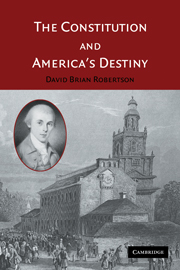Book contents
- Frontmatter
- Contents
- List of Tables and Figures
- Preface
- Acknowledgments
- List of Abbreviations
- 1 Politics and the Constitution
- 2 The Policy Crisis of the 1780s
- 3 James Madison's Plan for the Constitutional Convention
- 4 The Political Landscape of the Constitutional Convention
- 5 Who Governs? Constituting Policy Agency
- 6 What Can Be Governed? Constituting Policy Authority
- 7 How Is the Nation Governed? Constituting the Policy Process
- 8 Our Inheritance: The Constitution and American Politics
- Index
8 - Our Inheritance: The Constitution and American Politics
Published online by Cambridge University Press: 11 November 2009
- Frontmatter
- Contents
- List of Tables and Figures
- Preface
- Acknowledgments
- List of Abbreviations
- 1 Politics and the Constitution
- 2 The Policy Crisis of the 1780s
- 3 James Madison's Plan for the Constitutional Convention
- 4 The Political Landscape of the Constitutional Convention
- 5 Who Governs? Constituting Policy Agency
- 6 What Can Be Governed? Constituting Policy Authority
- 7 How Is the Nation Governed? Constituting the Policy Process
- 8 Our Inheritance: The Constitution and American Politics
- Index
Summary
Look through [the Constitution] from beginning to end, and you will not find an article which is not founded on the presumption of a clashing of interests.
– Senator (and former Constitutional Convention delegate) Jonathan Dayton, November 24, 1803The delegates who came to Philadelphia in the spring of 1787 could not have envisioned the Constitution they signed in September, or the uses to which Americans would put it. Their Constitution was the by-product of unanticipated political compromises. Instead of fully solving their central political dilemma – to ensure satisfactory public policy from a republican national government that would not itself threaten their vital interests – they had narrowed the scope of the problem. They built a partially finished national policy-making process, furnished it with an incomplete set of policy tools, and required extraordinary cooperative efforts to make the government work.
James Madison was among the first Americans to put the Constitution to work. Elected to the first House of Representatives, Madison initially urged his colleagues to interpret national powers and presidential authority broadly, as he had at the Constitutional Convention. But when Secretary of the Treasury Alexander Hamilton proposed economic plans diametrically opposed to his vision for the nation's economic development, Madison began to bring together Hamilton's opponents in a coalition unified by limited constitutional authority and states' rights. As secretary of state and later president, Madison used the Constitution with principled flexibility to achieve his policy purposes.
Madison's experiences illustrate the Constitution's enduring effects on America's destiny.
- Type
- Chapter
- Information
- The Constitution and America's Destiny , pp. 236 - 266Publisher: Cambridge University PressPrint publication year: 2005



